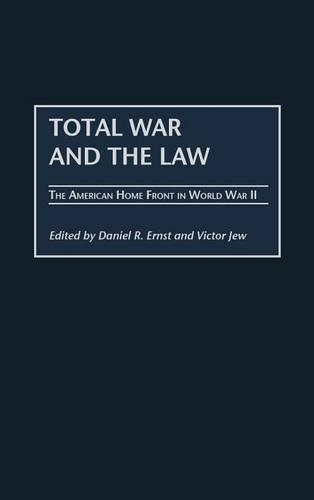
Total War and the Law: The American Home Front in World War II
(Hardback)
Publishing Details
Total War and the Law: The American Home Front in World War II
By (Author) Daniel R. Ernst
Edited by Victor Jew
Bloomsbury Publishing PLC
Praeger Publishers Inc
30th December 2002
United States
Classifications
General
Non Fiction
342.730412
Physical Properties
Hardback
248
Description
Now, more than ever, we need to avoid nostalgia in thinking about the Good War. This collection of essays reveals some of the challenges that Americans' commitment to the rule of law faced during the Second World War. As a total war, World War II required an unprecedented mobilization of society and growth of the federal government. The American state survived as a government of laws, not men, but in a very different form than its prewar counterpart. Using examples from the war era, this study demonstrates that major wars can imperil and transform one of our most deeply held values, the notion that public officials are constructed by law. As a result of total war, the political landscape changed, and, with it, Americans' notions of what law could do. Supreme Court justices endangered their reputation as being above politics through their behind-the-scenes relations with FDR, and in several important constitutional decisions they relinquished the judicial supremacy that many Americans had considered a crucial safeguard of freedom. The national government's power to tax was dramatically expanded in ways that left tax resistors looking like cranks rather than freedom fighters. When New Dealers tried to realize the potential of law as a vehicle of social organization, they fell prey to conservative rivals in the federal bureaucracy and Congress, but this defeat did nothing to slow the overall expansion of the administrative state, which continued under the formal oversight of the federal judiciary.
Reviews
[i]t will be of interest to those concerned about legal and political history. Those interested in state-building also will find this book quite valuable...Given the in-depth treatment provided to seven areas by the essays in this work, those topics are well covered...On the whole, the Ernst-Jew collection provides detailed coverage of several aspects of the law during World War II and shows how the administrative state was changed for all time. As America now experiences an undeclared "war on terrorism," those wondering about how the law will be changed by the current "war" (for lack of a better term) and how the justices' own feelings towards today's war will influence their jurisprudence would do well to read this book.-Law and Social Inquiry
Ernst and Jew bring together scholarship about the war era that illustrates how major wars can imperil and transform the notion that public officials are constructed by law.-The Register of the Kentucky Historical Society
"it will be of interest to those concerned about legal and political history. Those interested in state-building also will find this book quite valuable...Given the in-depth treatment provided to seven areas by the essays in this work, those topics are well covered...On the whole, the Ernst-Jew collection provides detailed coverage of several aspects of the law during World War II and shows how the administrative state was changed for all time. As America now experiences an undeclared "war on terrorism," those wondering about how the law will be changed by the current "war" (for lack of a better term) and how the justices' own feelings towards today's war will influence their jurisprudence would do well to read this book."-Law and Social Inquiry
"Ernst and Jew bring together scholarship about the war era that illustrates how major wars can imperil and transform the notion that public officials are constructed by law."-The Register of the Kentucky Historical Society
"[i]t will be of interest to those concerned about legal and political history. Those interested in state-building also will find this book quite valuable...Given the in-depth treatment provided to seven areas by the essays in this work, those topics are well covered...On the whole, the Ernst-Jew collection provides detailed coverage of several aspects of the law during World War II and shows how the administrative state was changed for all time. As America now experiences an undeclared "war on terrorism," those wondering about how the law will be changed by the current "war" (for lack of a better term) and how the justices' own feelings towards today's war will influence their jurisprudence would do well to read this book."-Law and Social Inquiry
Author Bio
DANIEL R. ERNST is Professor of Law at Georgetown University Law Center. He is the author of Lawyers against Labor (1995). VICTOR JEW is an Assistant Professor at Michigan State University.
